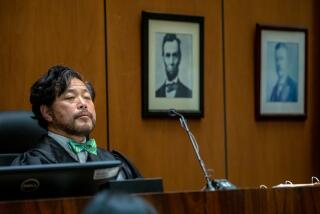Computer Disk Barred From Henley Case : Evidence: Judge rules that data said to detail ex-Ram’s alleged role in drug ring cannot be used.
SANTA ANA — A federal judge ruled Monday that a computer disk said to contain former Rams cornerback Darryl Henley’s account of his alleged involvement in a cocaine-trafficking ring could not be admitted as evidence in Henley’s trial.
U. S. District Judge Gary Taylor said the information on the disk, seized from the office of a Los Angeles attorney during a legal search for evidence in an unrelated case last year, did not fall under the “plain view” rule, which allows the admission of something found in obvious sight by law enforcement during a search for other evidence.
Taylor said the information on the disk--a 10-page missive from Henley to attorney Angela Wallace--was clearly meant to remain confidential.
“The incriminating evidence, if any, appears at the end of a lengthy letter,” and searchers would have had to peruse the entire document to find it, Taylor said.
Assistant U. S. Attorney John Rayburn Jr. said he reserved the right to use the information to impeach Henley should he testify later in the case.
The issues surrounding the disk, seized by Los Angeles Police Detective Richard Kellogg during an investigation of an auto insurance fraud ring, became increasingly muddled Monday when Assistant U. S. Attorney Deidre Z. Eliot announced that Kellogg had threatened to make trouble for the government side if he were forced to testify about the disk.
Eliot told the court that Kellogg, who initiated contact with the U. S. attorney’s office to tell prosecutors about the disk’s contents, did not want to testify at Monday’s hearings because he plans to be on vacation with his family in Massachusetts.
Eliot said Kellogg told her Thursday that if forced to testify he would “get the disk thrown out” of evidence by saying that Eliot had suggested he lie to the court about how much he revealed to her about the narrative.
Eliot said Kellogg, at her insistence, had revealed to her only the general nature of what was on the disk.
Although Kellogg had threatened to say that he had read Eliot the entire 10-page narrative during a telephone call, he later admitted he had not, she said. If he had, Eliot would have been in possession of information that was not legally obtained, and that might have tainted the government’s case against Henley.
Monday, Roger Cossack, Darryl Henley’s attorney, said he planned to investigate how much Kellogg told Eliot and if the actions of the prosecutor constituted misconduct. He already has filed a motion to have the case against Henley dismissed.
“They now know Henley’s innermost thoughts from a letter he wrote to his attorney,” Cossack said. “You saw how quick they were to say they would use it to impeach Henley later. I don’t know what this cop did or didn’t say.”
The trial of Henley and five other defendants, originally slated for May, then moved back to Aug. 23, was bumped Monday to Jan. 10, 1995, to accommodate the calendars of the attorneys, which now contain television as well as courtroom appearances.
Cossack, somewhat sheepishly, told Taylor that if the trial did not begin Aug. 23 or after Jan. 1, he might have to excuse himself because of his commitment to serve as a commentator for CNN during the murder trial of O.J. Simpson.


